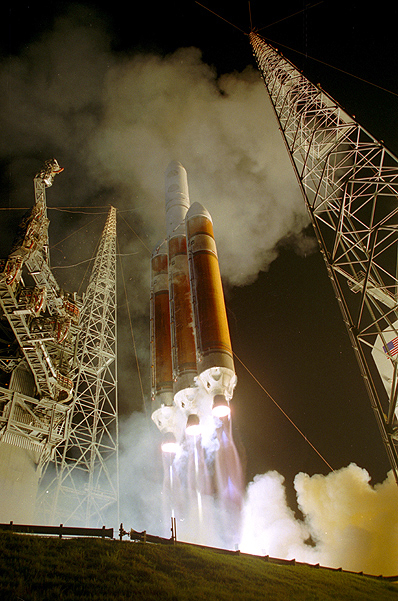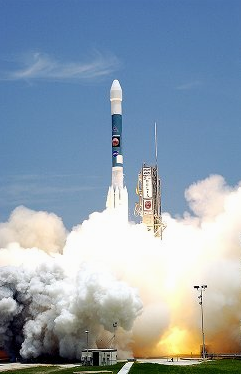On Friday, we examined the importance of Newton’s 3rd law of motion. In our discussions, different explanations for the motion of jets and rockets were proposed and considered. The front runners were;
- at launch, the ground pushes back against a rocket
- during flight, air pushes back against a plane
Unfortunately, the lack of ground and air (or any other gas) meant that neither of these models were able to explain the propulsion of an object in space. It was at this point we remembered Newton’s 3rd law of motion (or here with non-rocket examples) from Standard Grade.
You’ve got to be careful with Newton’s 3rd law of motion, it’s easy to get confused. Bonus question: What’s wrong with this explanation?
I found a photograph that provides a stunning visualisation of Newton’s 3rd law in action during the launch of a DeltaIV rocket. You can read the details of setting up for this photo here.

image courtesy of Ben Cooper, Launchphotography.com
The photo was taken at very short range (about 30m) from the launch site and clearly shows hot gases being forced out of the exhaust at high speed. When a rocket forces out gas, the expelled gas pushes back on the exhaust with an equal force. Since the exhaust is part of the rocket’s structure, the entire rocket is propelled in the opposite direction to the gas.
It is this pushing back on the exhaust that provides thrust for a rocket. It doesn’t matter if the rocket is on the launch pad, in mid air or outer space. As long as it can push gas out of the exhaust, it will be able to propel itself forwards using Newton’s 3rd law of motion.
We don’t normally get a clear view of the hot gases being forced out of a rocket in launch photographs. A lot of the smoke seen in images like the one shown below is actually steam.

NASA/courtesy of nasaimages.org
There are two main sources of steam during launch. The most obvious is the burning of fuels but NASA also soaks launch platforms with water just before and after launch so that the massive sound waves don’t damage the vehicle being launched. There is a wikipedia article on the use of water during space shuttle launches.



